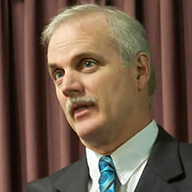 |
|
| Volume 19 Number 10 October 2017 | Page 15 |
Brian R. Kenyon
 Memorial Day is about remembering those Americans who lost their lives in war. Those of us on this side of life can only say “Thank You” to those who gave the ultimate sacrifice to secure and maintain the freedoms we enjoy. It took faithfulness to the cause of freedom for them to have given their lives. However, there is an even greater cause than that of political freedom—the cause of Christ! We can all be encouraged by those we find in Scripture who paid the ultimate price for that cause. Stephen is one such example. The characteristics he displayed will also enable us to live for the Lord, even if that means paying the ultimate price in this life for our faithfulness. Like Stephen, we must be:
Memorial Day is about remembering those Americans who lost their lives in war. Those of us on this side of life can only say “Thank You” to those who gave the ultimate sacrifice to secure and maintain the freedoms we enjoy. It took faithfulness to the cause of freedom for them to have given their lives. However, there is an even greater cause than that of political freedom—the cause of Christ! We can all be encouraged by those we find in Scripture who paid the ultimate price for that cause. Stephen is one such example. The characteristics he displayed will also enable us to live for the Lord, even if that means paying the ultimate price in this life for our faithfulness. Like Stephen, we must be:
Willing to Serve Tables
Stephen first appears in Acts 6. The Jerusalem church was concerned about helping people in need, as should all Christians (James 1:27; Galatians 6:10). As their present situation stood, this church could not see to the needs of the Grecian widows (Acts 6:1). The apostles could not leave their work in “the word of God” to “serve tables” (Acts 6:2). Thus, they told the congregation, “Therefore, brethren, seek out from among you seven men of good reputation, full of the Holy Spirit and wisdom, whom we may appoint over this business; but we will give ourselves continually to prayer and to the ministry of the word” (Acts 6:3-4).
Stephen was among the seven men that the congregation chose (Acts 6:5). He met the qualifications. First, he was of “good reputation [honest report, KJV],” which meant that his peers thought well of his integrity. Second, he was “full of the Holy Spirit.” We know that for Stephen this involved miraculous powers (Acts 6:8). Third, he was “full…of wisdom” (Acts 6:3). Stephen was willing to do what many in our day would think is too menial—serve tables! Would we be willing to do this for the cause of Christ? We would if we possessed those same qualifications. We must be of “good reputation” (3 John 12). Although Christians today are not miraculously “filled with the Holy Spirit,” we are still commanded to be “filled with the Spirit,” non-miraculously (Ephesians 5:18). Stephen may have had a miraculous type of wisdom (cf. 1 Corinthians 12:8), but we receive our wisdom from asking God (James 1:5). Would our character allow us to “serve tables” if that is what the Lord needed?
A Fearless Teacher of God’s Word
Though he was selected to serve tables, Stephen did not hesitate to take advantage of the opportunities he had to teach others the Word of God. It may have been that his work of serving tables took him among people and that providential opportunities arose for him to teach. His teaching was plain, clear and irrefutable. Even the most learned men of the synagogue “were not able to resist the wisdom and the Spirit by which he spoke” (Acts 6:10). As a result of his uncompromising teaching, he met opposition from those who did not like the truth. He was falsely accused and framed.
Then they secretly induced men to say, “We have heard him speak blasphemous words against Moses and God.” And they stirred up the people, the elders, and the scribes; and they came upon him, seized him, and brought him to the council. They also set up false witnesses who said, “This man does not cease to speak blasphemous words against this holy place and the law; for we have heard him say that this Jesus of Nazareth will destroy this place and change the customs which Moses delivered to us” (Acts 6:11-14).
Stephen, however, was ready to answer (Acts 6:15), and answer he did! He gave a brief history of God’s people (Acts 6:2-36); he showed that Christ was that Prophet whom Moses said would come (Acts 6:37-38). Further, he showed how the Jews of his day, like their ancestors, had not kept the law (Acts 6:39-53). Christians today must also be fearless teachers of God’s Word. We may not preach publicly, and we may not be “scholars,” but all of us must take advantage of the opportunities we have to teach God’s Word. As parents, we must teach our children God’s Word (Ephesians 6:4). This means, of course, that we must know God’s Word (2 Timothy 2:15). No matter what our position in life, it takes courage to teach and live God’s Word. Do we have that courage?
Faithful unto Death
Stephen had spoken the truth, but instead of his hearers being “cut [pricked, KJV] to the heart” and seeking forgiveness as those on Pentecost did (Acts 2:37), “they were cut to the heart, and they gnashed at him with their teeth” (Acts 7:54). Stephen’s death was a direct result of his preaching. Some preaching puts the listeners to sleep, but with Stephen’s preaching, the listeners put him to sleep—permanently (until Jesus comes again, 1 Thessalonians 4:15-17). Stephen’s preaching affected him personally. He was slandered by false witnesses (Acts 6:13), brought before the High Priest (Acts 7:1), and died a cruel and heartless death (Acts 7:54-60). Stephen’s death affected the church. It brought great sorrow (Acts 8:2), and it caused the church to be “scattered abroad” (Acts 8:3-4; cf., 11:19).
Stephen’s death affected the cause of Christ. All except the apostles left Jerusalem, and what might have seemed like the end of the church resulted in the expansion of the church; they went everywhere, preaching, teaching and planting the church (Acts 8:4)! At his death, there was significance in what Stephen saw and in what he said. He saw “the heavens opened and the Son of Man standing at the right hand of God” (Acts 7:56), which showed the concern and involvement of Jesus when His disciples suffer death. Stephen said, “Lord Jesus, receive my spirit” (Acts 7:59), which showed his complete confidence in Christ, and “Lord, do not charge them with this sin” (Acts 7:60), which showed his Christ-like attitude (cf., Luke 23:34).
Stephen’s death sheds light on Jesus’ statement, “be thou faithful unto death, and I will give thee a crown of life” (Revelation 2:10). This does not simply mean to be faithful until the day we die, but it means be faithful, even if our faithfulness costs us our life! Jesus said, “Do not fear those who kill the body but cannot kill the soul. But rather fear Him [God] who is able to destroy both soul and body in hell” (Matthew 10:28).
Conclusion
Stephen gave his life for the cause of Christ. He stands as an example to us. Do we have the disposition that we would even serve tables if that is what the Lord asked of us? Are we fearless in teaching the Word of God? Are we faithful unto death? May the Lord give us strength to give our lives to Him, to always be willing to do what He says and to “not grow weary in well doing” (Galatians 6:9).![]()
David’s Charge to Solomon
Therman Hodge
 “As for you, my son Solomon, know the God of your father, and serve Him with a loyal heart and with a willing mind; for the Lord searches all hearts and understands all the intent of the thoughts. If you seek Him, He will be found by you; but if you forsake Him, He will cast you off forever. Consider now, for the Lord has chosen you to build a house for the sanctuary; be strong, and do it” (1 Chronicles 28:9-10 NKJV). David exhorted the people to fear God. Another record of the charge appears in 1 Kings 2:1-4, which reads:
“As for you, my son Solomon, know the God of your father, and serve Him with a loyal heart and with a willing mind; for the Lord searches all hearts and understands all the intent of the thoughts. If you seek Him, He will be found by you; but if you forsake Him, He will cast you off forever. Consider now, for the Lord has chosen you to build a house for the sanctuary; be strong, and do it” (1 Chronicles 28:9-10 NKJV). David exhorted the people to fear God. Another record of the charge appears in 1 Kings 2:1-4, which reads:
Now the days of David drew near that he should die, and he charged Solomon his son, saying: “I go the way of all the earth; be strong, therefore, and prove yourself a man. And keep the charge of the Lord your God: to walk in His ways, to keep His statutes, His commandments, His judgments, and His testimonies, as it is written in the Law of Moses, that you may prosper in all that you do and wherever you turn; that the Lord may fulfill His word which He spoke concerning me, saying, ‘If your sons take heed to their way, to walk before Me in truth with all their heart and with all their soul,’ He said, ‘you shall not lack a man on the throne of Israel.’”
The servant of God must “know God.” Solomon was charged to “know the God of thy father” (2 Chronicles 8:9). The apostle John wrote by inspiration how one can demonstrate that he knows God—by keeping His commandments (1 John 2:4-5). Keeping the commands of God is evidence of knowing God.
Solomon was also to “serve Him.” He was to serve with a “perfect heart” (v. 9-10 KJV) and so ought all Christians to serve God (Acts 11:23). Further, Solomon was to serve with “a willing mind.” No other kind of service is acceptable to God. One’s service needs to be rendered with reverence—“godly fear” (Psalm 2:11; Hebrews 12:28). After all, whose servants are we (Romans 6:16-18)? Since Christians are servants of God, how should they serve—“heartily” (Colossians 3:23-24).
Solomon was to “take heed.” David’s exhortation to his son was, “Don’t delay.” We also ought to seek the Lord early and continually. “…The Lord is with you while you are with Him. If you seek Him, He will be found by you; but if you forsake Him, He will forsake you” (2 Chronicles 15:2). Likewise, we need to “take heed” and “continue” with God. “Take heed to yourself and to the doctrine. Continue in them, for in doing this you will save both yourself and those who hear you” (1 Timothy 4:16). Especially, even Christians need to take heed lest we fall (1 Corinthians 10:12-13).
David told Solomon to “be strong and do it.” Strength is essential—morally and spiritually. The children of God are to “be strong in the Lord” (Ephesians 6:10). The doing part of God-given religion must not be overlooked. Doing is vital (James 1:27)! Christians need to be busy for our Lord (1 Corinthians 15:58); God calls busy people. For instance, Moses was with Jethro’s flocks, Gideon was threshing wheat, David was with his father’s sheep, Nehemiah was bearing the king’s cup, Peter and Andrew were casting their nets, James and John were mending their nets, and Paul was busy persecuting Christians. There is no room for the lazy or the idle in the Lord’s service.![]()